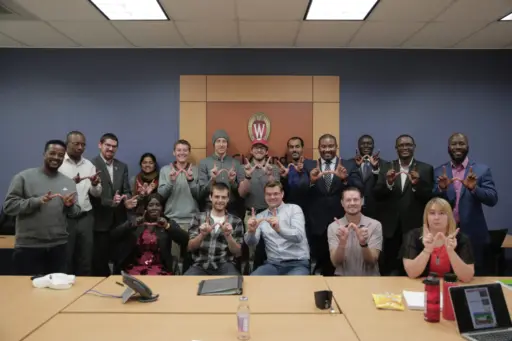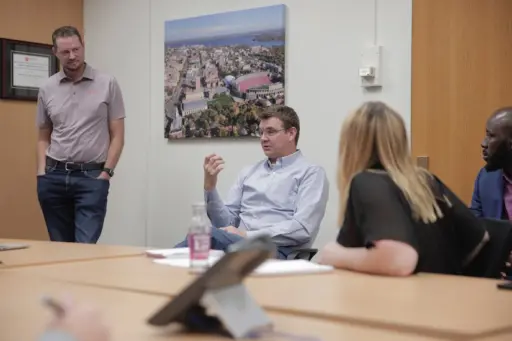A massive dumpsite lies in the heart of the municipality of Kanifing.
Kanifing sits on the Republic of The Gambia’s Atlantic Coast and is one of the West African country’s eight local government areas. Kanifing, which is near the capital city of Banjul, is home to nearly 500,000 people.
The Bakoteh Dumpsite takes up roughly 18 hectares. What was once a quarry has, for decades, been used as an unregulated landfill. Now, as the Kanifing Municipal Council looks to remediate the site, it is seeking advice from James Tinjum, a University of Wisconsin-Madison associate professor of civil and environmental engineering and director of the department’s Geological Engineering Program, and his students.
 James Tinjum’s class poses with Mayor Talib Ahmed Bensouda, from the Municipality of Kanifing in Gambia, during his visit in October 2019. The class is working on a project to devise potential remediation plans for the Bakoteh Dumpsite in Kanifing.
James Tinjum’s class poses with Mayor Talib Ahmed Bensouda, from the Municipality of Kanifing in Gambia, during his visit in October 2019. The class is working on a project to devise potential remediation plans for the Bakoteh Dumpsite in Kanifing.
The Bakoteh Dumpsite, as it exists today, is full of mounds of waste, has no fencing or other barriers to block public entry, and is easily accessible by foot. Residents come to the site to collect cans, cardboard, wood, cloth and other materials to sell to middlemen who in turn send the refuse to countries such as China for recycling. It’s a public health hazard, with flies, disease-carrying mosquitos, rats and other vermin breeding near or in homes of the 300 or so people who live on the dumpsite itself.
Tinjum, an expert on landfill design and development, visited Kanifing in 2019 with colleague Kaba Bah, a research assistant in UW-Madison’s Cooperative Institute for Meteorological Satellite Studies, to view the site and meet with municipal leaders as they develop remediation plans. Kanifing is working with the City of Madison, Wisconsin, through a sister-city relationship established in 2016. Tinjum’s work with the municipality was initiated through this sister-city program.
“It’s basically turned into an undesigned, uncontrolled landfill in the middle of an urban area,” Tinjum says. “Without controls, it’s going to get worse. We are advising the municipality on how to clean this up and close it, whether that’s digging it up and burning it, putting a cover on top, fencing it in or turning it into a green space.”
Kanifing Mayor Talib Ahmed Bensouda says the dumpsite, combined with poor waste management practices, has fostered malaria outbreaks. Because the site is open, domestic animals such as cattle can wander in and feed, which has led to instances of food poisoning.
The municipality has created a task force to consider options for closing the dump and for designs of a new landfill that will be located safely away from residential areas. Bensouda says he hopes to have the preparation completed and work underway by the end of the two-and-a-half years left in his current term.
 CEE Associate Professor James Tinjum talks to students about a remediation project for the Bakoteh Dumpsite in the Municipality of Kanifing in Gambia.
CEE Associate Professor James Tinjum talks to students about a remediation project for the Bakoteh Dumpsite in the Municipality of Kanifing in Gambia.
One way the site could ultimately benefit Kanifing, Bensouda says, is as a recreational space or site for some other type of development. With much of Kanifing’s land already developed, the municipality has a sore need for both.
“This site has been an issue for the community for the past 30 years,” he says. “It’s surrounded by schools, hospitals and residential areas. Our long-term goal is to close it down and turn it into a facility that serves the community.”
In addition to his own work as an advisor on the project, Tinjum has brought students in his graduate-level remediation geotechnics class aboard to design remediation plans for the site through the fall semester. The task force will consider all of the students’ proposals and may choose to implement one. Tinjum says there’s a possibility that the site could be used to convert the gases from decomposing waste into energy.
“Considering that a lot of the metals and plastics get scalped and recycled, there’s probably a fair amount of organic compounds left,” Tinjum says. “Some considerations are to install gas wells, collect the methane from the landfill, and burn it for electricity—or possibly for compressed natural gas or biodiesel. For example, the Dane County landfill here in Madison collects methane it produces and converts it to compressed natural gas. A similar option would make use of the decomposition of the organic waste that’s in the Bakoteh site.”
Tinjum’s project is, for himself and his students, an example of the Wisconsin Idea—the idea that the university’s knowledge should be shared beyond campus—in action.
“The beauty of this type of project is it’s not a fictitious, out-of-the-book project. It is a real project that they are designing solutions for, and one of those solutions is going to get done. We’re taking our knowledge and our expertise to the boundaries of the state and beyond,” he says. “This just happens to extend to the other side of the world.”
Bensouda says that the municipal council are planning to fully leverage the expertise available at UW-Madison to tackle the challenges on the Bakoteh dumpsite.
“This is an opportunity that many municipalities where we come from don’t have,” Bensouda says. “We aren’t planning to waste it.”